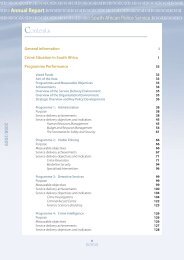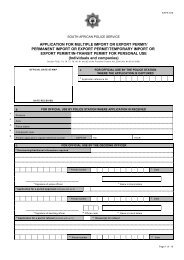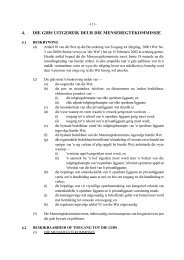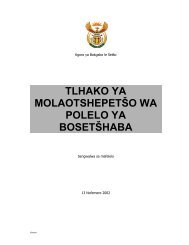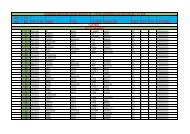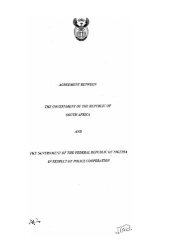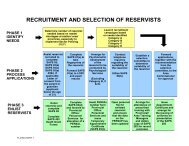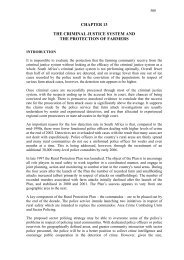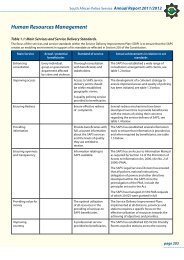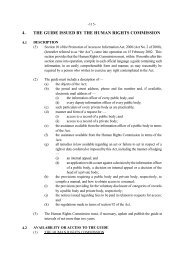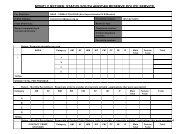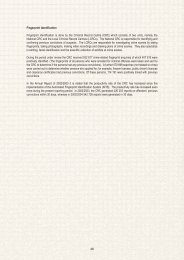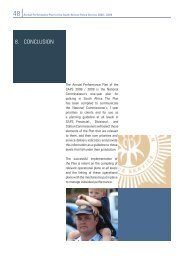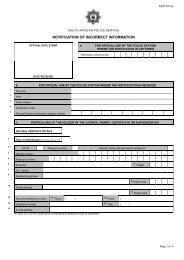Untitled - Saps
Untitled - Saps
Untitled - Saps
You also want an ePaper? Increase the reach of your titles
YUMPU automatically turns print PDFs into web optimized ePapers that Google loves.
cooperation with the Social Cluster departments to address the underlying causes of<br />
crime and the factors that exacerbate violent crime.<br />
• History was made when the first pilot programme in crime prevention, which was<br />
designed and developed from a needs analysis conducted by the Crime Prevention<br />
Guardian Committee, was presented to police members ranging from the rank of<br />
constable to inspector in Gauteng. This learning programme consisted of five study units<br />
and was aimed at cultivating a proactive approach to policing among SAPS members.<br />
• The SAPS ensured that the World Economic Forum, Aids conference, Heads of Missions<br />
Conference and SADC Council of Ministers Conference were incident free. The SAPS<br />
was able to secure safe provincial and local government elections where voters could<br />
exercise their right to vote for the political party of their choice.<br />
• The SAPS successfully participated in disaster operations conducted during the<br />
Mozambique floods, as well as operations to prevent the spread of cholera and foot-andmouth<br />
disease in KwaZulu-Natal.<br />
37<br />
• Cross-border operations and assistance to neighbouring countries proved to be of<br />
enormous value in preventing the spillover of crime into South African territory.<br />
Operations that were conducted in Mozambique resulted in the recovery and destruction<br />
of a significant number of arms and ammunition.<br />
• The Industrial Development Corporation, Sage SA and the SAPS signed an agreement<br />
on 28 September 2000 to implement an Automated Fingerprint Identification System<br />
(AFIS).<br />
• Sweden donated R16 million to improve service delivery in the SAPS. The money was<br />
used to improve police management skills.<br />
• It was announced that the SAPS Equestrian Unit and the SAPS Dog Unit would merge.<br />
Police dogs managed to detect and recover 151 316 kg of narcotics.<br />
• The SAPS again provided forensic expertise to its neighbouring countries. For the first<br />
time in eight years, police members from six African countries received instruction in<br />
forensic science at the Forensic Science Laboratory in Silverton.<br />
• The Detective Academy in Pretoria launched its first empowerment programme for<br />
female detectives.<br />
• The Detective Academy presented narcotics detection and related courses to five<br />
countries in the SA Developing Community.<br />
A comprehensive programme was launched to train all police members<br />
in the values and principles of community policing. This policing style<br />
is based on the premise that a community and its police service are<br />
equal partners and have a shared responsibility in ensuring safety<br />
and security.<br />
• Italy, in conjunction with the UN Office for Drug Control and Crime Prevention,<br />
donated state-of-the-art contraband-detection equipment worth R1,1 million to the<br />
SAPS for deployment at South Africa’s borders with Swaziland and Mozambique. The<br />
three portable narcotics-detection systems, seven infrared scoops and three fibre scoops<br />
would be used to target trafficking in drugs, firearms and hijacked and stolen vehicles.



